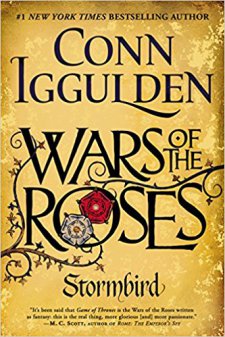 Based on the recommendation of Helen of She Reads Novels, I decided to try Conn Iggulden’s series Wars of the Roses. This period of British history has always been fascinating to me, yet confusing, and I have read several nonfiction books about it, as well as a few stand-alone novels about major players in the wars.
Based on the recommendation of Helen of She Reads Novels, I decided to try Conn Iggulden’s series Wars of the Roses. This period of British history has always been fascinating to me, yet confusing, and I have read several nonfiction books about it, as well as a few stand-alone novels about major players in the wars.
When I picked up what I thought was the first book in the series, Margaret of Anjou, I realized it was the second. So, I had to hurriedly get a copy of Stormbird. This accident assures that I will be reading at least the first two of the series.
The novel begins in 1437. King Henry VI, who is clearly not the warrior his father was, has been ceaselessly praying for an end to the Hundred Years War with France. He commands his spymaster, Derry Brewer, to find a way to a truce.
The agreement made with France is that Henry will marry Margaret of Anjou in exchange for the lands of Anjou and Maine, which Henry’s father won back from the French. At no time does Henry give thought to the countless English families who will be displaced in these two provinces.
The point of view moves from person to person throughout the novel, but no one character is central to the story. Some of these characters are the young Margaret of Anjou; Derry Brewer; the loyal William de la Pole, Earl of Suffolk; Richard Plantagenet, Duke of York; Thomas Woodchurch, a former longbowman who is displaced from his farm by the truce and decides to fight; and Jack Cade, a resentful renegade who leads a band of Kentish men against London. Most of these characters were actual historical people, with the exception of Derry Brewer. At first, I thought this constant shift in point of view would become annoying, but I finally realized it allowed me to get to know those characters better.
Iggulden admits to compressing time, making a period of almost 20 years seem like months. I think he could have just as easily indicated some passing of time, because it is occasionally jarring to think only a few months have passed, only to be brought up short by remarks, for example, that the king and queen have been married for years without issue.
Although most of the books I’ve read agree that toward the end of the wars, anyway, the Yorkists had the better claim to the throne, in this preamble to the wars, the Duke of York is definitely the villain. Although he is in charge of Normandy at the time of the truce, he does nothing to protect the fleeing English from the French armies and actively works to blame his inaction on Suffolk, who does the best he can when he takes over York’s position. I notice that the novel is dedicated to a descendant of John of Gaunt, whose immediate descendants made up the Lancastrian side of the conflict.
Overall, I found the novel quick moving and suspenseful, with interesting characters. I’ll be happy to read the second book in this series.
Related PostsHenry VI, Part I
The Wars of the Roses
Richard III: England’s Black Legend
Advertisements Share this:




